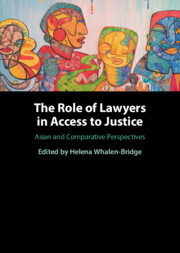Book contents
- The Role of Lawyers in Access to Justice
- The Role of Lawyers in Access to Justice
- Copyright page
- Dedication
- Epigraph
- Contents
- Figures
- Tables
- Appendices
- Contributors
- Foreword
- Acknowledgements
- Abbreviations
- 1 Understanding and Comparing Access to Justice
- Part I Access to Justice in Asia
- Part II Comparative Perspectives on Access to Justice
- 13 Access to Justice and an Islamic Ethic of Justice
- 14 Lawyering in Indonesia’s Religious Courts: Legal Aid, Procedural Justice, and Pragmatism
- 15 Access to Justice and Legal Aid in the Syariah Courts in Malaysia: A Colourful but Threadbare Patchwork System
- 16 The Syariah Court of Singapore: Achieving a More Formal Access to Justice
- 17 Access to Justice in Israel: Rights, Legal Aid, and Pro Bono in a Lawyer Dominant Environment
- 18 Vuk’uzenzele – Arise and Act: Lawyers and Access to Justice in South Africa
- Index
16 - The Syariah Court of Singapore: Achieving a More Formal Access to Justice
from Part II - Comparative Perspectives on Access to Justice
Published online by Cambridge University Press: 29 September 2022
- The Role of Lawyers in Access to Justice
- The Role of Lawyers in Access to Justice
- Copyright page
- Dedication
- Epigraph
- Contents
- Figures
- Tables
- Appendices
- Contributors
- Foreword
- Acknowledgements
- Abbreviations
- 1 Understanding and Comparing Access to Justice
- Part I Access to Justice in Asia
- Part II Comparative Perspectives on Access to Justice
- 13 Access to Justice and an Islamic Ethic of Justice
- 14 Lawyering in Indonesia’s Religious Courts: Legal Aid, Procedural Justice, and Pragmatism
- 15 Access to Justice and Legal Aid in the Syariah Courts in Malaysia: A Colourful but Threadbare Patchwork System
- 16 The Syariah Court of Singapore: Achieving a More Formal Access to Justice
- 17 Access to Justice in Israel: Rights, Legal Aid, and Pro Bono in a Lawyer Dominant Environment
- 18 Vuk’uzenzele – Arise and Act: Lawyers and Access to Justice in South Africa
- Index
Summary
Singapore’s Syariah Court has shifted over the years, from an informal court less reliant on written law to a more formal court with established law and procedure. This shift has in many ways supported access to justice, but challenges remain. Focusing on divorce in the Syariah Court, the chapter analyses illustrative examples of jurisdictional issues which impact access to justice. The chapter also critiques the resources available to improve the experiences of litigants navigating the process, which can be overwhelming for the uninitiated, and discusses the role and type of lawyers who practise at the Syariah Court, reflecting on the fact that most do not have any formal training in Muslim law. This chapter recommends methods of expanding access to justice in the Syariah Court further, including the need to incorporate technology to aid unrepresented litigants and lawyers alike.
- Type
- Chapter
- Information
- The Role of Lawyers in Access to JusticeAsian and Comparative Perspectives, pp. 296 - 309Publisher: Cambridge University PressPrint publication year: 2022

